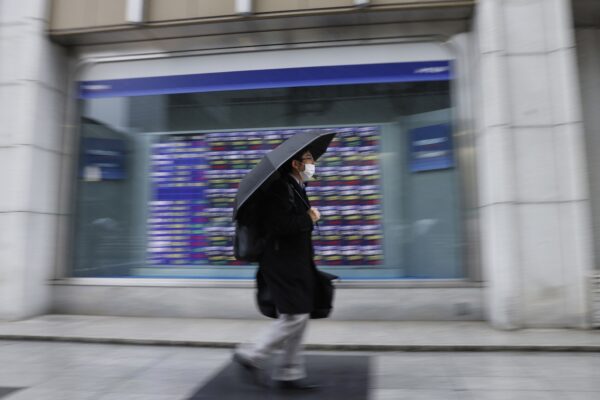By Rita Nazareth
Stocks slumped after a hotter-than-estimated inflation reading bolstered the case for the Federal Reserve to keep rates higher for longer, which could make the odds of a soft landing look slimmer.

The slide in the S&P 500 added to its worst weekly selloff since early December. The tech-heavy Nasdaq 100 tumbled about 2% amid a jump in Treasury yields. The two-year rate hit 4.8%, the highest since 2007. The dollar rose against all of its Group-of-10 peers. Swaps are now pricing 25 basis-point hikes at the Fed’s next three meetings. Expectations on the peak rate edged higher to about 5.4% by July.
The personal consumption expenditures price index increased 0.6% from a month earlier, the most since June. Excluding food and energy, the core PCE also climbed 0.6%. Personal spending, after adjusting for changes in prices, jumped 1.1%, the largest advance since March 2021 following weakness at the end of last year.
The latest figures underscore the risks of persistently high inflation. Much of the easing that was celebrated at the end of last year has largely been erased after revisions and the acceleration in January. Furthermore, resilient consumer spending paired with the exceptional strength of the labor market will make it more difficult for the Fed to get inflation to its 2% goal.
Comments:
Krishna Guha, vice chairman at Evercore:
“The likelihood of achieving a soft landing dips, with the risk of no-landing potentially forcing the Fed to push rates higher and hold longer, with greater risk that this ultimately pushes the economy into a mild recession. So risk-off pure and simple. We still think the Fed is not likely to return to 50bp hikes, though that risk has nudged up with the latest data.”
Chris Zaccarelli, chief investment officer at Independent Advisor Alliance:
“It is much too soon for the Fed to say ‘mission accomplished.’ It is far too early to extend duration and buy the dips in bond prices, let alone trying to continue to buy the dips in the stock market. We have been exercising much more caution and have advised our clients to be careful and not aggressive at this point in the economic cycle.”
Peter Boockvar, author of the Boock Report:
“Bottom line, Treasury yields are moving higher in response to the higher than expected inflation stats and reminder that while the trend will still be down, it will still take time to get to some Fed comfort level. Either way, at least looking at the core PCE, we FINALLY have ZERO real interest rates. I know some are still trying to figure out how many hikes the Fed has left, but it’s not many and AGAIN, higher rates for a longer time frame should be the focus.”
Matt Maley, chief market strategist at Miller Tabak + Co.:
“The stock market is responding the moves in Treasury yields. If these yields remain at/near their recent highs, it’s likely going to be a rough day for the stock market.”
Jeffrey Roach, chief economist at LPL Financial:
“The Fed may still decide to hike by 0.25% at the next meeting but this report means that the Fed will likely continue hiking into the summer. Markets will likely stay choppy during these months where higher rates have yet to materially cool consumer spending.”
Fed Bank of Cleveland President Loretta Mester said the Fed needs to keep raising rates to get inflation under control, adding she still sees rates rising “somewhat” above 5% and staying there for a time. “We’re going to have to do a little more to get back to price stability of 2%,” she told CNBC.
Investors are dumping equities and cash alike in favor of bonds as they position for the risk that the Federal Reserve persists with hawkish policy moves, Bank of America Corp. strategists said.
Global equity funds lost $7 billion in outflows in the week through Feb. 22, while $3.8 billion left cash funds, according to a note from the bank, which cited EPFR Global data. At $4.9 billion, bonds drew additions for an eighth straight week in the longest such streak since November 2021, the team led by Michael Hartnett said.
Money managers are fortifying portfolios and hedging the risk of a prolonged inflation fight by sticking to credit maturing in just a few years.
Some funds are actively cutting so-called duration, a measure of sensitivity to interest rates, to limit the fallout if central banks keep hiking to tackle inflation. Others are simply focusing on short-dated notes as the additional yield they get from longer securities is too small to justify the risk of a slump when rates rise.
In corporate news, Boeing Co. sank after pausing deliveries of its 787 Dreamliner over a documentation issue with a fuselage component. Carvana Co. slumped on a much wider loss than Wall Street had expected for the used-car retailer. Beyond Meat Inc. surged on sales that exceeded expectations and the plant-based meat maker showed progress toward its goal of becoming profitable.
On the geopolitical front, the White House will raise tariffs on more than 100 Russian metals, minerals and chemical products, it said Friday in a statement announcing a fresh round of measures to mark the one-year anniversary of the invasion of Ukraine.
US Treasury Secretary Janet Yellen warned China and other nations against providing material support to Russia, saying any such actions would amount to an evasion of sanctions and would “provoke very serious consequences.”
Elsewhere, the yen retreated as Bank of Japan Governor nominee Kazuo Ueda warned against any magical solution to produce stable inflation and normalize policy as he largely stuck to the existing central bank script in the first parliamentary hearing to approve his appointment.
Some of the main moves in markets:
Stocks
- The S&P 500 fell 1.5% as of 9:57 a.m. New York time
- The Nasdaq 100 fell 1.9%
- The Dow Jones Industrial Average fell 1.3%
- The Stoxx Europe 600 fell 0.8%
- The MSCI World index fell 1.4%
Currencies
- The Bloomberg Dollar Spot Index rose 0.6%
- The euro fell 0.5% to $1.0548
- The British pound fell 0.5% to $1.1950
- The Japanese yen fell 1.1% to 136.19 per dollar
Cryptocurrencies
- Bitcoin fell 0.2% to $23,836.93
- Ether fell 0.4% to $1,639.06
Bonds
- The yield on 10-year Treasuries advanced six basis points to 3.94%
- Germany’s 10-year yield advanced seven basis points to 2.55%
- Britain’s 10-year yield advanced seven basis points to 3.66%
Commodities
- West Texas Intermediate crude fell 1% to $74.65 a barrel
- Gold futures fell 0.3% to $1,821.90 an ounce
This story was produced with the assistance of Bloomberg Automation.
–With assistance from Isabelle Lee.
More stories like this are available on bloomberg.com.




